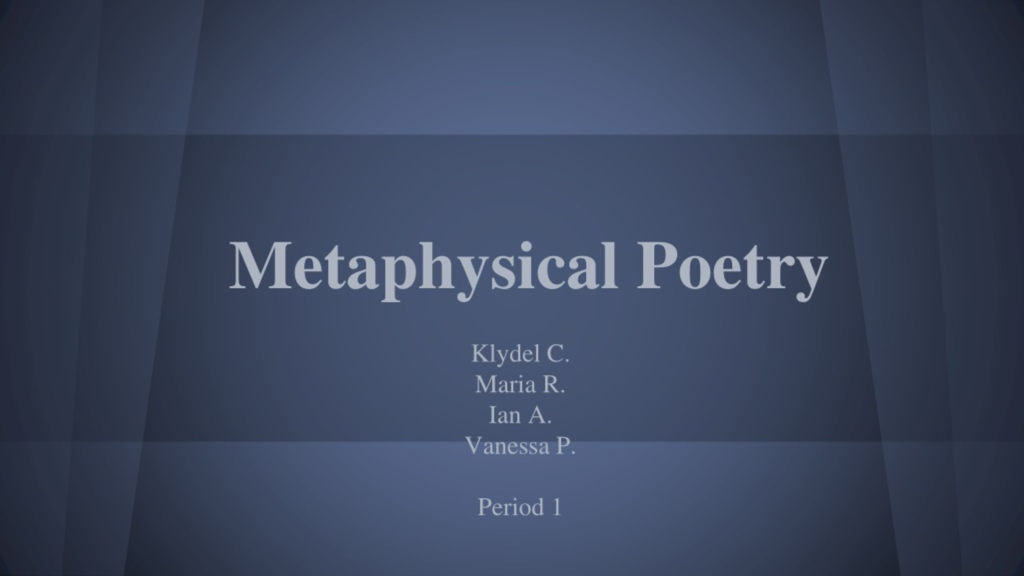Table of Contents
Metaphysical poetry is a unique style of writing that focuses on deep and thought-provoking questions about life, reality, and even the existence of God. These poems are known for their complicated ideas and clever use of language. Writers who created metaphysical poetry often mixed humor with serious topics, making their work interesting and challenging. The main focus of metaphysical poetry is to explore big, often unanswerable questions about the world and our place in it.
The poets who wrote in this style, like John Donne and George Herbert, used strange and surprising comparisons in their poems. These comparisons, called “conceits,” helped them explain complex ideas in creative ways. Metaphysical poetry is a perfect mix of logical thinking and emotional feelings, helping readers see the world from a different perspective.
What is Metaphysical Poetry? A Simple Guide to Understanding
Metaphysical poetry is a special type of poetry that asks big questions about life, God, and the world. It doesn’t just tell a simple story—it digs deep into our thoughts and feelings. This kind of poetry is known for being complex and thoughtful. It mixes smart ideas with emotions to make readers think about things in a new way.
Poets who wrote metaphysical poetry often used strange and surprising comparisons, called “conceits.” These comparisons made the poems interesting and sometimes hard to understand. The goal was not just to tell a story, but to explore difficult questions, like “Does God exist?” or “What is real?” These questions can make us wonder about everything around us.
Key Features of Metaphysical Poetry: Wit, Paradoxes, and More
Metaphysical poetry is full of interesting features that make it stand out. One of the main features is wit. These poets didn’t just write seriously about deep topics—they also used humor to make their point. This wit helped the poets connect big ideas with everyday feelings and experiences.
Another key feature of this type of poetry is paradox. A paradox is when something seems impossible, but it might actually be true. For example, a poet might say that love is both painful and beautiful at the same time. This kind of writing makes metaphysical poetry unique and fun to read.
- Wit: Smart and funny ways to explain big ideas.
- Paradoxes: Contradicting ideas that make you think harder.
- Conceits: Unusual comparisons that bring new meaning.
Why Metaphysical Poetry Makes You Think Deeply About Life

Metaphysical poetry is different from other kinds of poems because it forces you to think deeply. The poets didn’t just write about what they saw around them. Instead, they asked questions that made people wonder about life itself. Poems would often ask big questions, like “What happens after death?” or “Can we ever really understand God?”
This kind of poetry helps us explore the deeper parts of our mind and soul. The metaphysical poets wanted us to see the world through a new lens, making us think carefully about the things we take for granted. Their work is not just about pretty words, but about questioning everything.
Metaphysical Poetry and Its Strange, Yet Beautiful Comparisons
One of the most interesting parts of metaphysical poetry is the strange and beautiful comparisons poets use. These comparisons are called “conceits,” and they are not simple metaphors. For example, in one famous poem, John Donne compares two lovers to a compass. At first, this might seem like an odd choice, but it helps the reader understand the connection between the lovers in a deep way.
These comparisons often seem unusual, but they are a big reason why metaphysical poetry is so special. They make us think harder about the meaning of things. Instead of simply saying “love is strong,” the poet might say “love is a compass,” which creates a whole new way of thinking about love.
The Role of Emotion in Metaphysical Poetry: Why Feelings Matter

In metaphysical poetry, emotion plays an important role in how the poet presents ideas. While the poetry is often logical and intellectual, it is also full of deep feelings. The poets wanted to show how serious topics, like religion or death, could also stir up emotions. These emotions made their poems more relatable to readers.
The combination of deep thinking and strong feelings makes metaphysical poetry unique. It’s not just about being smart or making big points. It’s about how those ideas connect with the heart. The poets used their feelings to add depth to their work, helping readers feel the weight of the questions they were asking.
Famous Metaphysical Poets You Should Know About
Metaphysical poetry has been shaped by some incredible poets over the years. The most famous of these poets is John Donne. He is often called the leader of metaphysical poetry. His poems dive into big questions about life, death, love, and faith.
Another key poet in this group is George Herbert. He used metaphysical poetry to explore religious themes and deep personal thoughts. His works often combine logic and emotional expression. Other poets like Andrew Marvell and Richard Crashaw also made important contributions to this style, creating poems that are still read today.
The Impact of Religion in Metaphysical Poetry: A Thoughtful Exploration
Religion is an important theme in metaphysical poetry. Many of the poets were deeply religious and used their poetry to explore questions about God, faith, and existence. For example, John Donne’s poems often wrestle with the idea of God’s presence in our lives. These poets used their poetry as a way to work through their own spiritual doubts and questions.
The metaphysical poets didn’t just take religious ideas at face value. They questioned, challenged, and explored what religion meant for them and the world. This thoughtful approach makes metaphysical poetry deeply philosophical and emotional at the same time.
- Spiritual Struggles: Poets wrestle with their faith and beliefs.
- God and Existence: Many poems explore the role of God in human life.
- Philosophical Poetry: Religion is explored deeply through logic and feelings.
Metaphysical Poetry’s Focus on Big Questions: Does God Exist?

Metaphysical poetry often asks the biggest questions about life, such as “Does God exist?” These questions don’t have easy answers, but the poets still tried to explore them. The poems might not give you a clear answer, but they make you think more deeply about what you believe.
This questioning nature is one of the reasons why metaphysical poetry is still popular today. It doesn’t just teach you answers—it helps you think about the questions yourself. Even though the poets lived hundreds of years ago, the questions they asked still matter today.
Conclusion
In conclusion, metaphysical poetry is a unique style that blends deep thinking with emotions. These poems ask big questions about life, love, and religion while using strange comparisons and humor. The combination of intellectual ideas and feelings makes metaphysical poetry interesting and fun to read. While it can be challenging to understand, it is also a powerful way to explore life’s most important mysteries.
If you are interested in poetry that makes you think deeply, metaphysical poetry is a great choice. The poets used their words not just to tell stories, but to ask questions that still matter today. By reading these poems, you can explore big ideas and connect with your own thoughts about life, making metaphysical poetry a timeless treasure.
FAQs
Q: What is metaphysical poetry?
A: Metaphysical poetry is a type of poem that explores big ideas about life, love, and religion using deep thoughts and creative comparisons.
Q: Who are the most famous metaphysical poets?
A: Some of the most famous poets include John Donne, George Herbert, Andrew Marvell, and Richard Crashaw.
Q: What makes metaphysical poetry different from other poetry?
A: Metaphysical poetry is different because it asks big, tough questions and uses complex ideas mixed with emotions and unusual comparisons.




